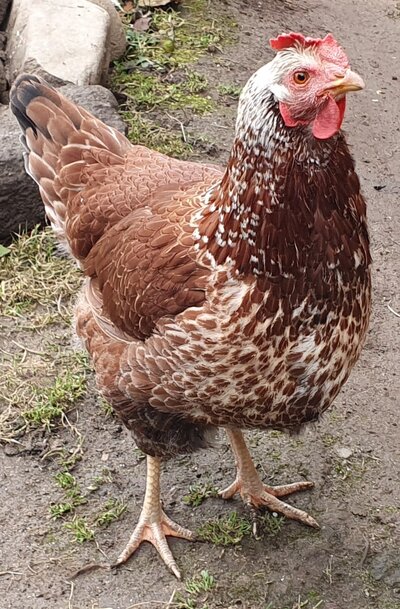- Jan 17, 2019
- 181
- 208
- 151
This is a weird one. I have treated different types of Canker (Thrichonomas) and Sour crop, so I thought I was prepared for everything.
One of my favourite hens had a heavy molt and then in the span of weeks started acting listless and losing weight. She is a 6yo mixed breed, was in perfect health before this.
I thought it was the molt, but then I noticed her opening the beak quite often like something was causing her irritation and some colourless slime coming out of it when she was drinking water. I opened her beak and took a look down the pipe, there was a yellow spongy substance under and around her tongue. I thought Canker and gave her Metronidazole for 5 days, the yellow subtance disappeared, but her condition did not improve. She was having harder and harder time swallowing, having her neck completely vertical in order to do so. It got to a point where her entire mouth and esophagus were covered in colourless slime and she was unable to eat or drink, her crop was empty 24/7, she started losing weight rapidly. I started her on Nystatin 48h ago - my go to for Sour crop, but I don't see a positive change. I have never had a Sour crop case where the crop is empty constantly, but I have read it is possible. She can still swallow the medicine, but can't eat. I fed her a liquid blended mix of yoghurt and boiled egg, 5 or 6 coffee spoons and some water a couple times today just to keep her alive. I also gave her a couple spoons of diluted apple cider vinegar between the Nystatin.
I am out of ideas and don't see her surviving this unless she starts eating. What can cause the above symptoms that is not affected by Metronidazole and Nystatin?
p.s. can't take her to a vet or do any tests on samples, they don't want to treat chickens around here
One of my favourite hens had a heavy molt and then in the span of weeks started acting listless and losing weight. She is a 6yo mixed breed, was in perfect health before this.
I thought it was the molt, but then I noticed her opening the beak quite often like something was causing her irritation and some colourless slime coming out of it when she was drinking water. I opened her beak and took a look down the pipe, there was a yellow spongy substance under and around her tongue. I thought Canker and gave her Metronidazole for 5 days, the yellow subtance disappeared, but her condition did not improve. She was having harder and harder time swallowing, having her neck completely vertical in order to do so. It got to a point where her entire mouth and esophagus were covered in colourless slime and she was unable to eat or drink, her crop was empty 24/7, she started losing weight rapidly. I started her on Nystatin 48h ago - my go to for Sour crop, but I don't see a positive change. I have never had a Sour crop case where the crop is empty constantly, but I have read it is possible. She can still swallow the medicine, but can't eat. I fed her a liquid blended mix of yoghurt and boiled egg, 5 or 6 coffee spoons and some water a couple times today just to keep her alive. I also gave her a couple spoons of diluted apple cider vinegar between the Nystatin.
I am out of ideas and don't see her surviving this unless she starts eating. What can cause the above symptoms that is not affected by Metronidazole and Nystatin?
p.s. can't take her to a vet or do any tests on samples, they don't want to treat chickens around here




